Introduction
Voice cloning, once relegated to the realm of science fiction, has now become an indispensable tool across many industries. The numbers speak volumes: the global voice cloning market was valued at an impressive $1.5 billion in 2022. Even more astonishing is the projection that it will skyrocket to an astounding $16.2 billion by 2032, showcasing a meteoric growth rate of 27.3% from 2023 to 2032.
This explosive expansion underscores the surging demand and the transformative potential of AI voice cloning tools. The promise of seamless voice replication illuminates the path ahead, and it all begins with choosing the right software.
In this comprehensive list, we embark on a journey to explore the best AI voice cloning tools. Our focus: the top 9 best voice cloning software solutions available today. As we delve into these remarkable offerings, we'll unveil their unique features, capabilities, and the diverse ways they shape our world.

What Is Voice Cloning?
Voice cloning is a groundbreaking technology that enables the creation of synthetic voices that closely mimic the unique characteristics of a human voice, including tone, intonation, and pronunciation. This transformative technology allows individuals, businesses, and industries to generate computer-generated speech that resembles a specific human voice.
At its core, it involves using advanced machine learning algorithms and AI(Artificial Intelligence) to analyze and replicate the nuances of a target voice. The result is a seamless and lifelike reproduction of that voice, which you can use for various applications.
9 Best Voice Cloning Software in 2025
1. Fliki
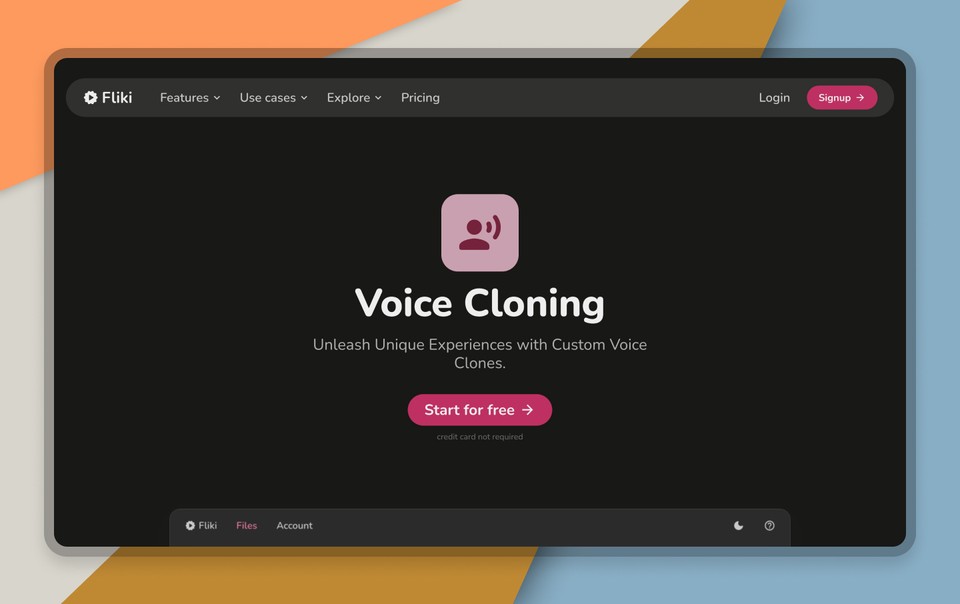
Fliki is a dynamic AI Video generation platform that redefines content creation by seamlessly combining video generation and voice cloning capabilities. Whether you're a newcomer or a seasoned professional, Fliki boasts an incredibly user-friendly interface, making it accessible to all. It offers a vast library of over 2000 voices spanning more than 80 languages and 100+ dialects.
Voice cloning is a remarkable highlight of Fliki's technology, enabling users to craft computer-generated voices that closely resemble their own. This feature is precious for individuals who must produce voiceovers using their unique vocal characteristics without the time or resources required for traditional voice recording.
Users can subscribe to the Premium plan and navigate to the voice cloning section to access this feature. Here, they can specify the voice's name and gender and record a consent and sample script of approximately 2 minutes.
Supported Voice Cloning Languages:
Fliki's Voice Cloning supports 32 languages. It includes:
-
🇺🇸 🇦🇺 🇨🇦 🇮🇳 🇸🇬 🇬🇧 English
-
🇫🇷 French
-
🇩🇪 German
-
🇮🇳 Hindi
-
🇮🇹 Italian
-
🇵🇱 Polish
-
🇧🇷, 🇵🇹 Portuguese
-
🇪🇸 Spanish
-
🇯🇵 Japanese
-
🇨🇳 Chinese
-
🇰🇷 Korean
-
🇮🇩 Indonesian
-
🇳🇱 Dutch
-
🇹🇷 Turkish
-
🇵🇭 Filipino
-
🇸🇪 Swedish
-
🇧🇬 Bulgarian
-
🇷🇴 Romanian
-
🇦🇪, 🇸🇦 Arabic
-
🇨🇿 Czech
-
🇬🇷 Greek
-
🇫🇮 Finnish
-
🇭🇷 Croatian
-
🇲🇾 Malay
-
🇸🇰 Slovak
-
🇩🇰 Danish
-
🇮🇳 Tamil
-
🇺🇦 Ukrainian
-
🇷🇺 Russian
-
🇭🇺 Hungarian
-
🇻🇳 Vietnamese
-
🇳🇴 Norwegian
2. Speechify
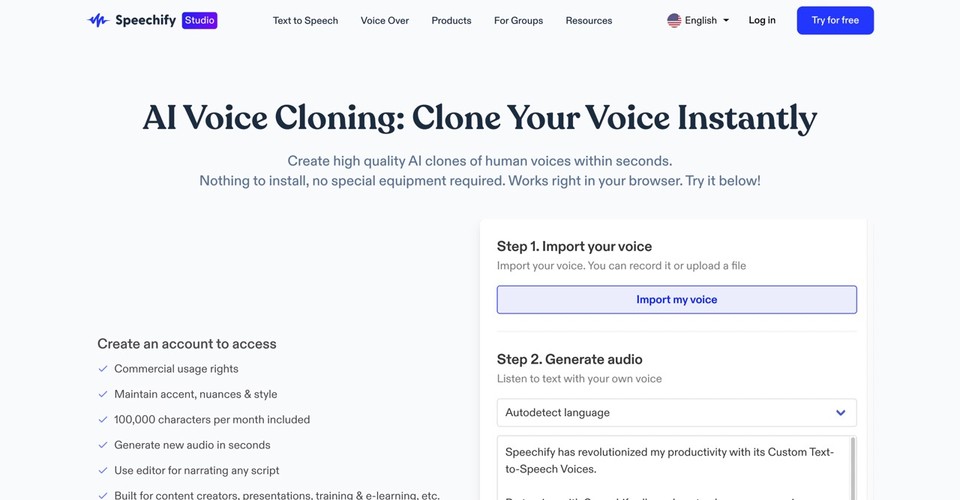
Speechify is a text-to-speech solution that enables users to create high-quality AI clones of human voices. This web-based tool requires no installation or special equipment and works directly in your browser like Fliki.
With Speechify, you can easily clone your voice for various purposes, including content creation, presentations, training, and more. Its decent interface and multiple features make it a good voice cloning tool for anyone looking to create a clone of their voice.
Supported Voice Cloning Languages:
Speechify's voice cloning supports eight languages. It includes:
-
🇺🇸 English
-
🇩🇪 German
-
🇵🇱 Polish
-
🇪🇸 Spanish
-
🇮🇹 Italian
-
🇫🇷 French
-
🇵🇹 Portuguese
-
🇮🇳 Hindi
3. Elai
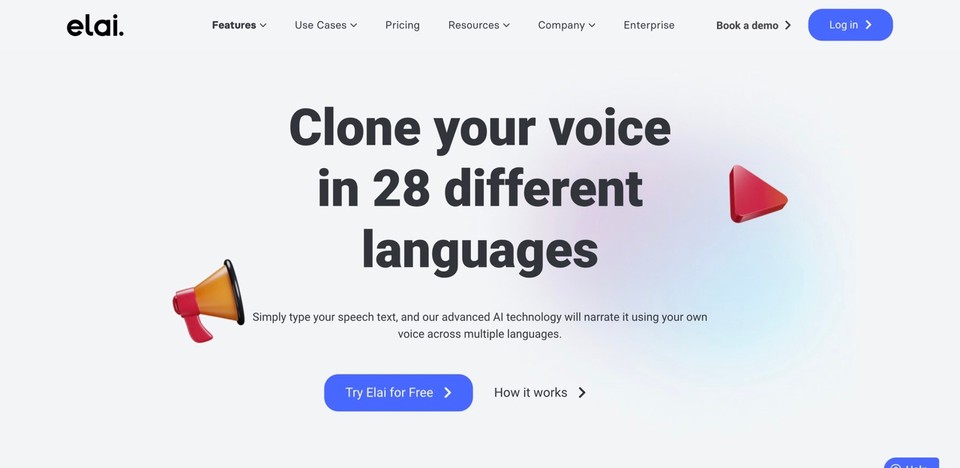
Elai is a cloud-based AI video generation platform that allows users to generate videos from text with the help of AI avatars and voice cloning. Elai offers a variety of features that make it easy for professionals to create videos, even if they have yet to gain prior experience.
Its voice cloning feature allows users to clone their voices in 28 languages. Users can quickly generate narrations and videos using their voices across multiple languages, creating a personalized and multilingual content experience.
Supported Voice Cloning Languages:
Elai's voice cloning supports 28 languages. It includes:
-
🇺🇸 English
-
🇩🇪 German
-
🇵🇱 Polish
-
🇪🇸 Spanish
-
🇮🇹 Italian
-
🇫🇷 French
-
🇵🇹 Portuguese
-
🇮🇳 Hindi
-
🇨🇳 Chinese
-
🇰🇷 Korean
-
🇳🇱 Dutch
-
🇹🇷 Turkish
-
🇸🇪 Swedish
-
🇮🇩 Indonesian
-
🇵🇭 Filipino
-
🇯🇵 Japanese
-
🇺🇦 Ukrainian
-
🇬🇷 Greek
-
🇨🇿 Czech
-
🇫🇮 Finnish
-
🇷🇴 Romanian
-
🇩🇰 Danish
-
🇧🇬 Bulgarian
-
🇲🇾 Malay
-
🇸🇰 Slovak
-
🇭🇷 Croatian
-
🇮🇳 Tamil
-
🇸🇦 Classic Arabic
4. Murf
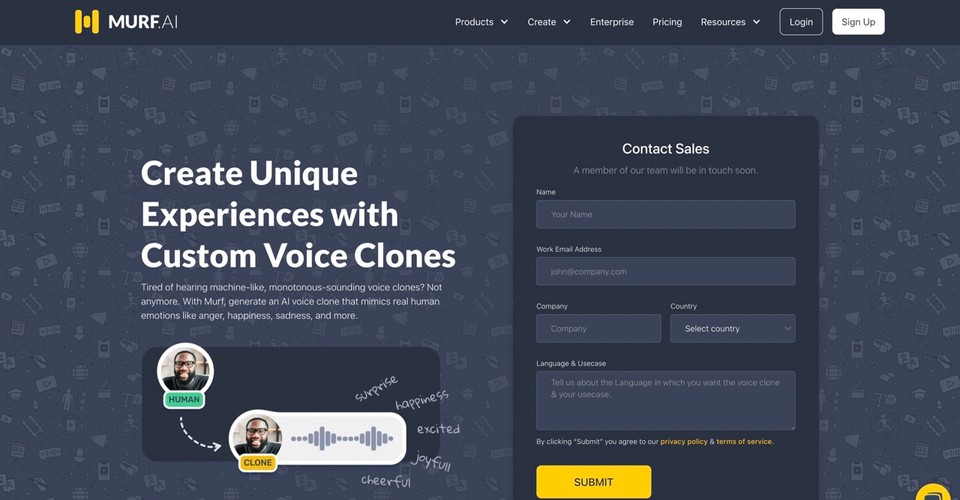
Murf is a popular text-to-speech tool with an AI voice cloning feature that allows users to create unique voice clones with realistic human emotions such as anger, happiness, sadness, and more.
Unlike traditional monotonous voice clones, Murf's AI technology can mimic many emotions, making voiceovers and narrations sound lifelike and engaging. However, you need to give approximately 1-2 hours of recordings in WAV format with specific settings for a particular voice style.
Supported Voice Cloning Languages:
Murf currently supports English only!
5. PlayHT
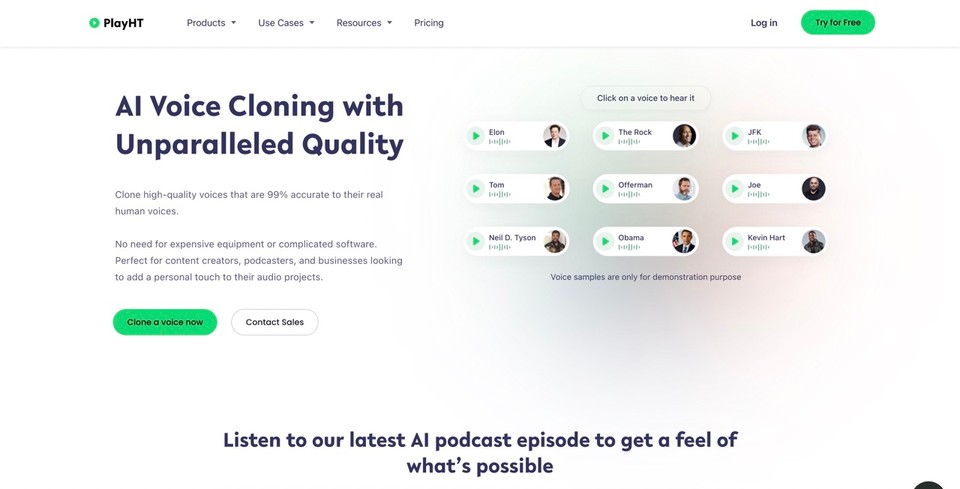
PlayHT is another popular text-to-speech tool that provides an AI-powered voice cloning option. It claims to offer high-quality voice clones with unparalleled accuracy, reaching up to 99% similarity to the original human voice.
PlayHT places a strong emphasis on data security. They implement two-factor authentication (2FA), manual voice print verification, and rigorous security measures to protect cloned voices. It provides a secure platform for content creators, podcasters, and businesses seeking to incorporate a personal touch into their audio projects.
Supported Voice Cloning Languages:
PlayHT currently supports English only!
6. Resemble AI
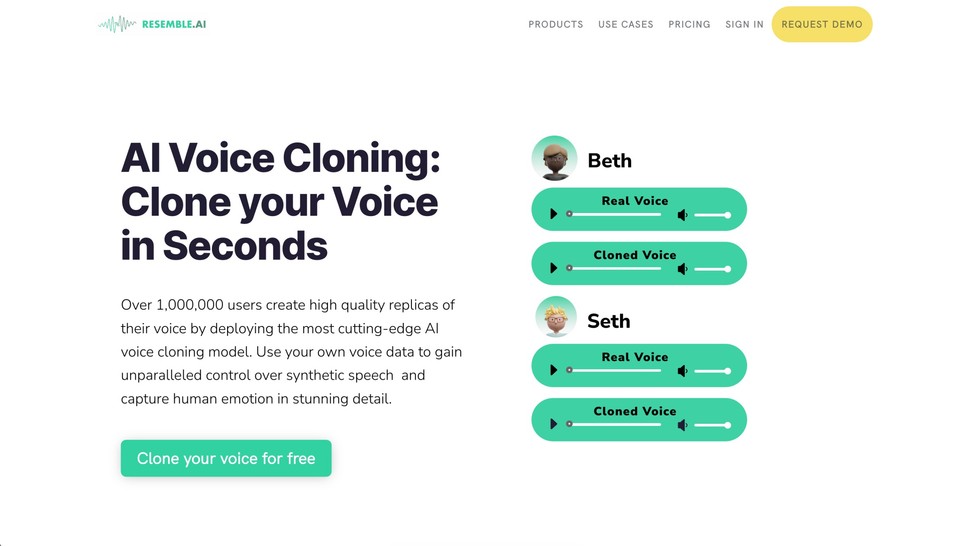
Resemble AI is a cutting-edge text-to-speech platform with advanced AI voice cloning features. This innovative technology allows users to create highly realistic and personalized voice clones, enabling them to bring their audio projects to life with a unique and engaging touch.
Resemble AI's AI-powered voice cloning technology can mimic human emotions like anger, happiness, sadness, etc. This emotional voice cloning capability makes the generated audio more engaging, natural, and relatable, allowing content creators, podcasters, and businesses to deliver a more immersive and impactful listening experience to their audience.
Supported Voice Cloning Languages:
Resemble AI gives access to the following languages on the Free and Basic tier:
-
🇪🇸 Spanish (MX)
-
🇫🇷 French
-
🇬🇧 British English.
Besides, Resemble provides 67 languages to Pro users.
7. Descript Overdub
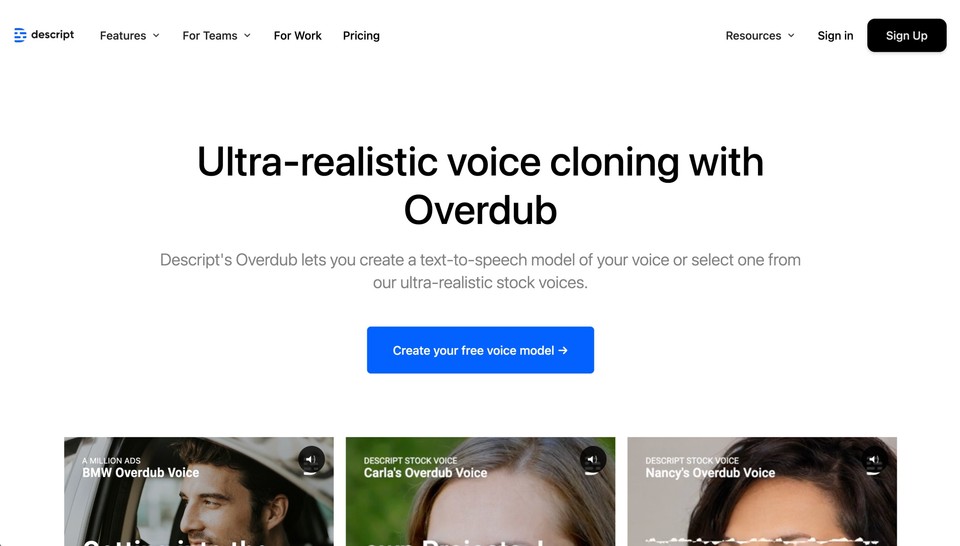
Descript Overdub allows users to create highly realistic voice clones of their voice. This cutting-edge technology enables users to make quick corrections to their audio recordings or generate entire messages in their voice without the need to re-record anything.
Overdub uses state-of-the-art voice synthesis to replicate the user's voice, making editing audio as easy as editing text. Users can clone their voice by recording a sample, and Overdub will learn their unique vocal characteristics to generate synthetic speech that blends seamlessly with the original recording.
Supported Voice Cloning Languages:
While Descript can automatically transcribe 23 languages, we couldn't find public information on supported voice cloning languages.
8. Lovo
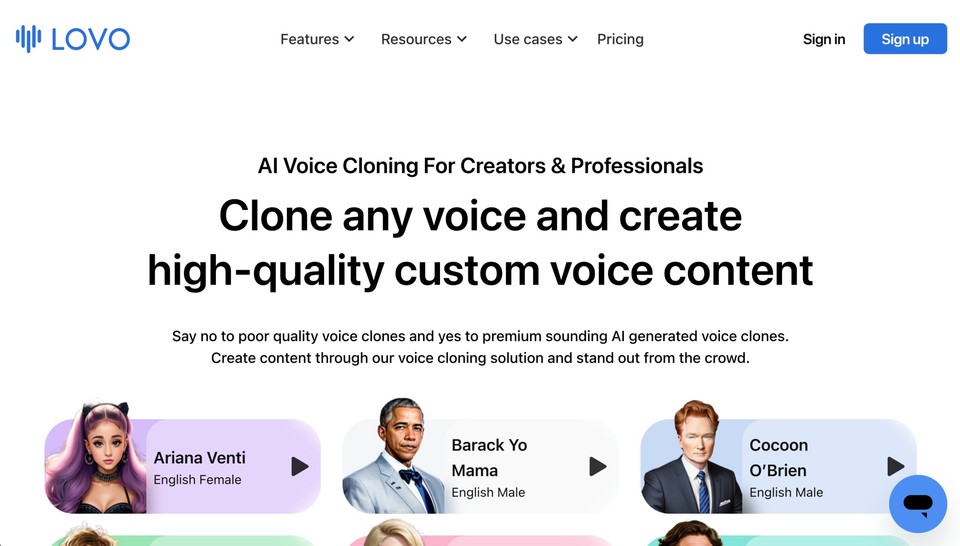
Lovo AI is one of the leading providers of quality AI voices in 100+ languages, offering decent support to users. LOVO's custom voices replicate the original voice, providing content creators and businesses with a seamless and immersive experience.
Lovo’s voice cloning technology collects a diverse dataset of voice recordings from the target voice, processes and organizes the data, trains a generative model using machine learning algorithms, and generates an AI clone of the original voice.
Supported Voice Cloning Languages:
While Lovo supports 100+ languages for AI voices, we couldn't find public information on supported voice cloning languages.
9. Voice AI
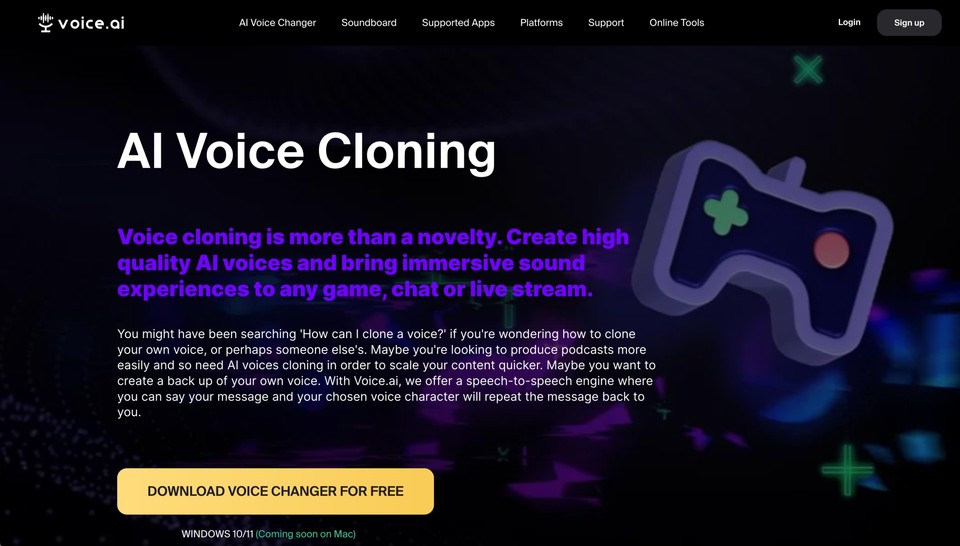
Voice AI provides a platform for AI voice cloning, allowing users to create AI voices for various applications like games, chats, and live streams. The technology enables users to clone voices, replicating human speech with synthetic voices that imitate the target voice through speech synthesis.
However, some users have expressed frustration with the app, mentioning issues related to misleading promotions, unexpected charges, and difficulties in obtaining refunds. This feedback highlights concerns about the app's pricing structure and customer service experience.
Supported Voice Cloning Languages:
Voice AI currently supports voice cloning in English only.
The Ethical Use of Voice Cloning
While a voice cloning software offers immense potential for creativity and efficiency, its ethical use is a topic of critical importance. As this transformative technology becomes more accessible, it's crucial to consider the ethical implications and boundaries that should guide its application. Let's delve into some key considerations for the ethical use of voice cloning:
1. Informed Consent
One of the foremost ethical principles in voice cloning is obtaining informed consent from individuals whose voices get cloned. Using someone's voice without explicit permission for any purpose, mainly commercial or entertainment can raise significant ethical concerns.
2. Misrepresentation and Deception
Voice cloning should not be used to deceive or mislead individuals. Using cloned voices to impersonate someone for fraudulent activities or pranks is unethical and potentially illegal.
3. Privacy Concerns
Respect for privacy is paramount. Using a voice cloning software to eavesdrop on private conversations, record personal information, or manipulate audio recordings without consent infringes individuals' privacy rights.
4. Commercial Use and Branding
While a voice cloning software can enhance branding and marketing efforts, it must be done transparently and with integrity. Misleading consumers to think they are interacting with a natural person when it's a synthetic voice can erode trust.
5. Legal Compliance
Adhering to copyright and intellectual property laws is essential. Using an AI voice cloning tool to clone the voices of public figures, celebrities, or copyrighted characters without permission can lead to legal repercussions.
6. Emotional Impact
Consider the emotional impact of voice cloning tools on individuals. Using synthetic voices for sensitive or emotional content, especially without disclosure, can be distressing and ethically questionable.
7. Accountability and Responsibility
Those using voice cloning technology bear a responsibility to ensure its ethical use. It includes verifying the sources of cloned voices, monitoring the content created, and taking corrective action if ethical concerns arise.
8. Transparent Disclosure
When synthetic voices are used in content, whether in videos, ads, or virtual assistants, disclosing their artificial nature to users or consumers is ethical. Transparency builds trust and helps users make informed decisions.
9. Cultural and Social Sensitivity
Voice cloning technology should respect cultural and social norms. Using it to mimic accents, dialects, or languages in a way that perpetuates stereotypes or disrespects cultural diversity is ethically problematic.
10. Regulatory Compliance
Adherence to relevant laws and regulations is non-negotiable. It's essential to stay informed about evolving legal frameworks related to voice cloning and ensure compliance.
In summary, the ethical use of voice cloning is about respecting individuals' rights, ensuring transparency, and upholding the principles of honesty and integrity. As technology evolves, ethical considerations must remain at the forefront to harness the potential of voice cloning for the betterment of society while minimizing its negative impacts.
Want to use your original voiceover? Check out the best audio recording software to record your voice.
Conclusion
In the fast-evolving landscape of technology, voice cloning has emerged as a true game-changer, offering endless possibilities to creators, businesses, and industries worldwide. As we conclude our journey through the five best voice cloning software options in 2025, one thing becomes abundantly clear: the future of content creation has never looked brighter.
In 2025 and beyond, the possibilities are boundless. Voice cloning is no longer science fiction; it's a tangible reality that empowers us to give voice to our imaginations, reach broader audiences, and craft experiences that resonate deeply with people across the globe.
However, as we navigate the thrilling landscape of voice cloning, let's not forget the ethical considerations that guide our journey. The responsible and respectful use of this technology is vital to maintaining trust and ensuring its positive impact on society.



